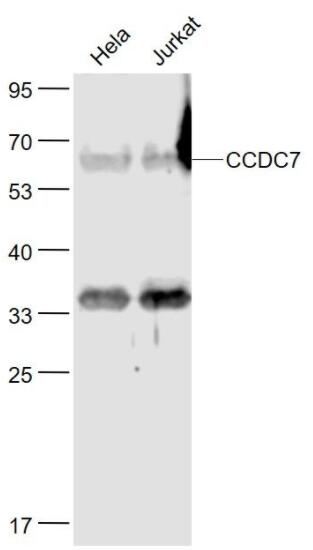Product Name :
CCDC7 Polyclonal Antibody Background :
The coiled-coil domain is a structural motif found in proteins that are involved in a diverse array of biological functions such as the regulation of gene expression, cell division, membrane fusion and drug extrusion and delivery. Some proteins that contain coil-coiled domains include c-jun, c-fos and tropomyosin. Coiled-coil domains consist of two or more ?helices packed together via interlacing side chains. CCDC7 (Coiled-coil domain-containing protein 7) is a 486 amino acid protein that contains a coiled-coil domain and is encoded by a gene that maps to human chromosome 10, which houses over 1,200 genes and comprises nearly 4.5% of the human genome. Defects in some genes that map to chromosome 10 are associated with Charcot-Marie Tooth disease, Jackson-Weiss syndrome, Usher syndrome, nonsyndromatic deafness, Wolman抯 syndrome, Cowden syndrome, multiple endocrine neoplasia type 2 and porphyria. There are two isoforms of CCDC7 that are produced as a result of alternative splicing events. Product :
0.01M TBS(pH7.4) with 1% BSA, 0.03% Proclin300 and 50% Glycerol. Storage&Stability :
Store at 4°C short term. Aliquot and store at -20°C long term. Avoid freeze-thaw cycles. Specificity :
CCDC7 Polyclonal Antibody detects endogenous levels of CCDC7 protein. Immunogen :
KLH conjugated synthetic peptide derived from human CCDC7:155-250/486 Conjugate :
Unconjugated Modification :
Unmodification
CCDC7 Polyclonal Antibody Background :
The coiled-coil domain is a structural motif found in proteins that are involved in a diverse array of biological functions such as the regulation of gene expression, cell division, membrane fusion and drug extrusion and delivery. Some proteins that contain coil-coiled domains include c-jun, c-fos and tropomyosin. Coiled-coil domains consist of two or more ?helices packed together via interlacing side chains. CCDC7 (Coiled-coil domain-containing protein 7) is a 486 amino acid protein that contains a coiled-coil domain and is encoded by a gene that maps to human chromosome 10, which houses over 1,200 genes and comprises nearly 4.5% of the human genome. Defects in some genes that map to chromosome 10 are associated with Charcot-Marie Tooth disease, Jackson-Weiss syndrome, Usher syndrome, nonsyndromatic deafness, Wolman抯 syndrome, Cowden syndrome, multiple endocrine neoplasia type 2 and porphyria. There are two isoforms of CCDC7 that are produced as a result of alternative splicing events. Product :
0.01M TBS(pH7.4) with 1% BSA, 0.03% Proclin300 and 50% Glycerol. Storage&Stability :
Store at 4°C short term. Aliquot and store at -20°C long term. Avoid freeze-thaw cycles. Specificity :
CCDC7 Polyclonal Antibody detects endogenous levels of CCDC7 protein. Immunogen :
KLH conjugated synthetic peptide derived from human CCDC7:155-250/486 Conjugate :
Unconjugated Modification :
Unmodification
-
 Primary: Anti- CCDC7 (bs-7991R) at 1/1000 dilution
Primary: Anti- CCDC7 (bs-7991R) at 1/1000 dilution
Bioworld Biotech only provide peptides for our antibodies and do not provide additional peptide customization services.
Price/Size :
USD 368/1mg/vial
Tips:
For phospho antibody, we provide phospho peptide(0.5mg) and non-phospho peptide(0.5mg).Describe :
Blocking peptides are peptides that bind specifically to the target antibody and block antibody binding. These peptide usually contains the epitope recognized by the antibody. Antibodies bound to the blocking peptide no longer bind to the epitope on the target protein. This mechanism is useful when non-specific binding is an issue, for example, in Western blotting (WB) and Immunohistochemistry (IHC). By comparing the staining from the blocked antibody versus the antibody alone, one can see which staining is specific; Specific binding will be absent from the western blot or IHC performed with the neutralized antibody.Formula:
Synthetic peptide was lyophilized with 100% acetonitrile and is supplied as a powder. Reconstitute with 0.1 ml DI water for a final concentration of 10 mg/ml.The purity is >90%,tested by HPLC and MS.
Storage:
The freeze-dried powder is more stable. For short time at 2-8°C. For long term storage store at -20°C.
Note :
This product is for research use only (RUO only). Not for use in diagnostic or therapeutic procedures.
 CCDC7 Polyclonal Antibody
CCDC7 Polyclonal Antibody  Datasheet
Datasheet COA
COA MSDS
MSDS SHIP
SHIP